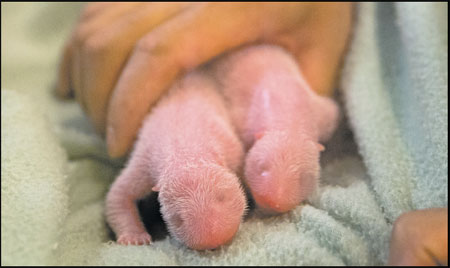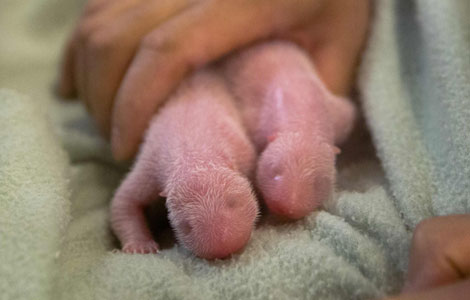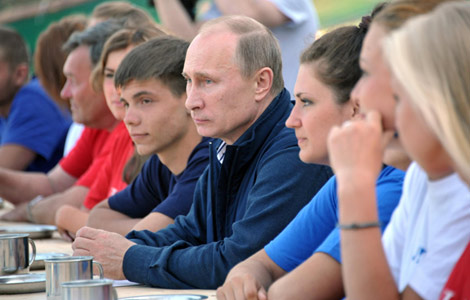Atlanta zoo's panda twins doing well
Updated: 2013-07-17 10:44
By Kelly Chung Dawson in New York (China Daily)
|
||||||||
|
The twin panda cubs, which weigh 145 and 99 grams, will grow their black and white coat in about a week. Provided to China Daily |
Tiny twin panda cubs were born to a 15-year-old giant panda named Lun Lun earlier this week at Zoo Atlanta, the first set of panda twins born in the US in 26 years. The second cub was a surprise, after an earlier ultrasound had seemed to indicate a solo cub.
"This is a success we share with all of our fellow zoological organizations working to understand and protect this iconic species, and we share our joy with our local community and with our colleagues in China," said Zoo Atlanta's president and CEO Raymond B. King in a statement. "Twins are an entirely new scenario for Lun Lun, Zoo Atlanta and our animal care teams, who will no doubt be extremely busy over the next few months."
The cubs are also the first giant pandas born in the US this year, and are the product of an artificial insemination taken from a 15-year-old panda named Yang Yang, who is also housed at the zoo. Zoo Atlanta worked closely with panda caretakers and scientists from the Chengdu Research Base of Giant Panda Breeding, Lun Lun's birthplace.
The mortality rate among panda infants is high, so the next few weeks will be crucial, said Rebecca Snyder, curator of mammals at Zoo Atlanta. Fortunately, one of the cubs is heavier than average, weighing in at 145 grams. The other is about average, at 99 grams.
"We're lucky, because one is bigger than average. But every single hour matters, so we're taking it one hour at a time. Panda cubs are very tiny, and their health is delicate. The next few days will be tense, but we're excited," Snyder said.
Twin births are not uncommon among pandas, but panda mothers have generally tended to favor one cub over the other, leaving the second to die. To protect both cubs, zookeepers and animal caretakers from the Arthur M. Blank Family Foundation Giant Panda Center are rotating the cubs in and out so that Lun Lun is only caring for one at a time during the first few months. The cubs, which will grow their famous black and white coat in about a week, were separated shortly after birth. Lun Lun and the cubs are also under 24-hour observation by a live video feed, as was the case during gestation.
Lun Lun was immediately protective, and is reluctant to give up either cub once she is holding it, Snyder said. Pandas generally do not place cubs on the ground for several weeks, so the caretakers have had to be strategic and careful in switching the cubs out. As a result of Lun Lun's reluctance to relinquish either cub, the rotation schedule has been slower than planned. Both cubs' diets have been supplemented with milk formula.
"She's keeping the cubs warm, and being a normal, good mom," Snyder said of Lun Lun. "It's normal for her to want to hold on to her cub."
In a statement, Snyder added that the zoo will adjust their strategy and caretaking according to the condition of the cubs and how Lun Lun reacts to the continued rotation.
"The panda team is tired and a little stressed, but happy," the statement reads. "The next few days are especially critical. So please continue to keep us in your thoughts. We can use the good vibes!"
If all goes well, the panda cubs will be available for viewing at Zoo Atlanta in about four months. Generally, cubs stay with their mothers until the weaning age of one and a half years. Zoo Atlanta, which received the International Conservation Award from the Association of Zoos and Aquariums last year, plans to follow the Chinese tradition of naming the cubs when they reach 100 days.
Worldwide giant pandas number less than 2,000 today, with approximately 300 in captivity and 1,600 in the wild. Successful conservation of the species will be a challenge, but one that signifies ongoing cooperation and goodwill between China and the US, Snyder said.
"We certainly see giant pandas as ambassadors for both the species and for China, because they are so important culturally and historically," she said. "We see this as a great relationship builder between the two countries."
kdawson@chinadailyusa.com
(China Daily USA 07/17/2013 page1)
Most Viewed
Editor's Picks

|

|

|

|

|

|
Today's Top News
China's US T-bill holdings hit record in May
GM's sales up 4% on strong US, China demand
China's US Treasury holdings hit record
New visa law offers lifeline to foreigners
Asiana passengers sue Boeing
Li highlights economic restructuring
Merkel's rivals go on attack over US spying
'Missile equipment' found aboard DPRK ship
US Weekly

|

|














